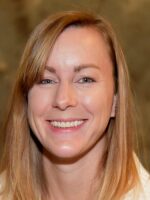One county in south-central Washington state has become a hub for renewable energy development. The issue has divided people living in Klickitat County – those who welcome development and those who steadfastly oppose it. Now, people are still waiting on new rules for future renewable projects.
Dozens of people gathered to speak at a hearing on Monday at the Klickitat County Planning Commission. At issue: How should large-scale solar and battery energy storage systems be sited in the county?
“I think it’s progress. You either grow or you die,” Ray Mosbrucker, who owns businesses in Goldendale and was once a county public utility district commissioner, said at the meeting.
For years, vocal residents have raised concerns about safety, noise, sightlines and property values.
At this meeting, though, more farmers showed up. Most of those farmers live on the east side of the county, where they said these strict rules make less sense because of a smaller population and fewer rainy days.
Each person got three minutes to speak, with instrumental music playing them off when they hit the time limit.
Several farmers asked county leaders to consider a way to help them survive lean years: allow solar projects with fewer restrictions than are currently proposed.
Rob Mercer is a fourth-generation farmer in Alderdale, Washington. He said his kids, the next generation of farmers, helped decide whether to allow solar leases on their property. Mercer described promoting new energy development as “America First.”
“ One way of looking at it from a farming perspective is we're just going to switch out to farming some solar,” Mercer said. “So we're harvesting the sun to make energy for the country.”
Other farmers raised concerns that a proposed 1-mile setback would drastically limit their ability to lease property to solar projects.
“The thing that actually particularly bothers me about it is you're giving one house the rights of 2,000 acres around them to end these projects,” said David Clinton, a wheat farmer in Bickleton. “It takes away rights from me, from other neighbors.”
However, people who helped write the proposed ordinance said the setbacks were for safety purposes.
Other people said they felt Klickitat County was getting the bum end of the deal with renewable energy projects. Yakama Nation members have previously raised concerns about losing access to traditional gathering locations.
Goldendale resident Warren Daisy said a utility-scale solar project is proposed near his property.
“ I feel like the people in Klickitat County, (who) live in this part of the county, are being walked all over,” he said.
Projects could be built in the eastern part of the county, he said, which could create less conflict.
Greg Wagner founded C.E.A.S.E., or Citizens Educated About Solar Energy, a group that’s opposed to renewable development in the county.
Wagner noted the proposed rules were developed by people who live in Klickitat County.
“ Those are people that live here and have a vested interest in our county. The developers all come from somewhere else,” he said.
For their part, developers who attended the meeting said the proposed rules were too stringent. They noted that might cause developers to turn to the state’s Energy Facility Site Evaluation Council, or EFSEC, for approval instead.
That’s exactly what Klickitat County said it hoped to avoid, aiming to gain more local control with solar and battery regulations.
At the meeting, developers called the restrictions “really, really difficult to meet” and “unworkable.”
“ As the ordinance is drafted, it will … really immediately require us to go the EFSEC route,” said Melissa Taylor, with ENGIE North America, a renewable energy development company.
Energy and environmental attorneys said the way the proposed ordinance was written wouldn’t protect the county from state approval of renewable energy projects.
Several planning commissioners said to not forget the vocal opponents who pushed for more local control of renewable energy development, even if more people spoke in favor of development at the Monday public hearing.
The commission will continue to take written comments through Friday. They’ll take another swing at the issue during their Oct. 20 meeting.


